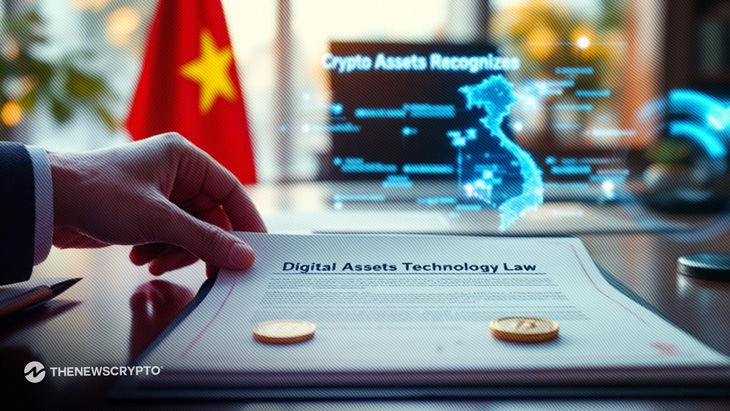Vietnam Passes Digital Law Recognizing and Regulating Crypto Assets

- Crypto Now Legal: Vietnam’s new digital law formally recognizes and regulates crypto assets for the first time.
- FATF Compliance: The law aims to align Vietnam with global AML norms, improving its chances of FATF gray list removal.
- Tech Sector Boost: Alongside crypto, the law promotes emerging technologies like AI and semiconductors.
The major development toward regulating the digital economy gained attention with the enactment of its first legal proclamation recognizing cryptocurrency and other digital assets. The National Assembly gave its assent to the “Law on Digital Technology Industry” on Saturday, June 14, 2025, marking a historic occasion concerning digital innovation and regulatory compliance in the country.
Set to be implemented in 2026, the new law establishes clear legal definitions and guidelines for virtual and crypto assets, which were previously operating in a regulatory gray zone. The legislation aims to bring greater clarity to Vietnam’s digital ecosystem while aligning it with international anti-money laundering (AML) standards, including those outlined by the Financial Action Task Force (FATF).
Addressing FATF Concerns and Regulatory Gaps
The period since 2023 has seen Vietnam virtually being on the FATF gray list, putting financial institutions in the country on a difficult path while subjecting all international transactions to greater scrutiny. Therefore, if adequately enforced, this law may bolster Vietnam’s stance with FATF by controlling the digital assets with stricter rules for classification, usage, and supervision.
The proactive approach is even considered as a maneuver to favor transparency and investor protection and make Vietnamese markets attractive for global fintech companies.
One of the most critical components of the law is its two-tier classification system for digital assets. It draws a formal distinction between virtual assets (such as gaming tokens or in-app currencies) and crypto assets, defined as digital assets that use encryption or similar digital technologies for creation, issuance, storage, or transfer.
This structured approach excludes fiat currencies and securities from the crypto asset definition, ensuring that existing financial regulations do not overlap or conflict with new digital laws.
According to The Investor Vafie Magazine, this clarity is expected to reduce fraud, improve taxation compliance, and streamline licensing for digital asset businesses.
A Broader Push for Tech Innovation
While the recognition of crypto assets may have taken the limelight, the “Law on Digital Technology Industry” is looked upon as a part of the larger machinery for development of the high tech sector in Vietnam.The legislation includes supportive measures to stimulate growth in areas such as artificial intelligence, semiconductors, and digital services, positioning Vietnam on a future-ready trajectory.
By offering legal certainty and modern governance models for digital platforms, the law encourages both local startups and international technology firms to invest in the Vietnamese tech landscape.
The Ministry of Information and Communications will serve as the primary regulatory authority, working in coordination with the State Bank of Vietnam and other financial bodies to ensure implementation.
Highlighted Crypto News Today:
Bitcoin Cash (BCH) Eyes Breakout as Price Hits $460
